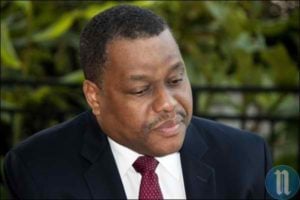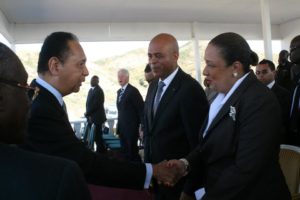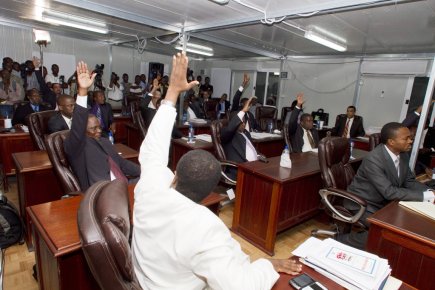Part two
Please, read part one here first: Occupy Haiti (I)
Armageddon, two years on…
Reconstruction year 2012…

Prime Minister Garry Conille – Source: Le Nouvelliste
“There was hope that the quake would bring an opportunity to break the country’s fatal cycle of struggle, catastrophe and indifference,” wrote the AP’s Jonathan M. Katz on the quake’s first anniversary last year. “But promises were not kept and no leader emerged, within Haiti or outside,” he added. A year later, “Build Haiti Back Better” stagnates; a collective promise dissipates, as unrealistic messianic emersion frustrates. Instead, news coverage exposed a painstakingly slow reconstruction process hindered by a disengaged international community, runaway non-governmental organizations, Haitian leaders’ ideological bickering and politics of destruction.
Analyzing Haiti’s state of affairs in his recent article “The Haitian President did not turn his policies into music,” Le Figaro’s Thierry Oberle noted, “In Haiti, a country where the president is an artist, politics remains a shadow theatre.” Nevertheless, President Martelly’s State of the Union address delivered at the Haitian National Assembly earlier this year rejected that premise, highlighting what the president perceived as important accomplishments for his administration. His free education initiatives for disadvantaged children, unilateral taxation of the Haitians living abroad to fund education, and clearing many displacement camps topped the president’s list. The Head of State also expressed concerns over the media’s unfavorable coverage, dressing his administration with a meager assessment, rather than exposing real progress.

Former dictator Jean-Claude Duvalier with the presidential couple – Source: President's facebook page
Following the president’s speech in the Haitian parliament, Prime Minister Garry Conille declared 2012 the year of reconstruction and enumerated a host of reconstruction initiatives his government would launch this year. Yet, nearly three months since his narrow parliamentary approval, Conille still struggled to wiggle free from Martelly’s shadow. Together however, the executive duo sang in unison: harmonious relationships between executive and legislative branches were instrumental to 2012’s success. While observers agreed such approach would help deflate tensions in Haiti’s hostile political environment, they reasoned the rhetoric did not reflect Haitian actualities. “It was only to save face,” inferred Oberle, referring to the executive’s ambitious goals. “While under the surface,” he added, “Trench warfare between the former singer elected in May and the ancient power-block that controls the parliament paralyzed the country in ruins.” Echoing these sentiments, Caribbean Creole News’ Claude Carre inferred, “Already, as this year begins, the potential for crisis is evident everywhere.” His article “A Country in Limbo, an Inexperienced President” offered critical insights into a saturated political environment decorated with confusion, warning signs and shortsightedness.
It was however the same media that called then candidate Martelly a political novice or outsider not belonging to the reining political élite, characteristics it said made him attractive to his supporters. After a seven-month crash course, rocked by political paralysis, power struggle and constitutional violations, critics noticed a different man emerging in the fragmented Haitian Palace. “The president embodies an entrenched neoliberal tradition,” asserted Oberle. “It has the support of part of the bourgeoisie with friendships rooted into the reign of Jean-Claude Duvalier, former dictator returned to Port-au-Prince just over a year ago,” he added. In the characterization of a diplomat to the popular French newspaper, “Martelly wanted to emancipate himself from certain realities, but he crashed into the wall of parliament,” revealed Oberle. With only two deputies from his party Repons Peyizan in parliament, the executive’s harmonious relationships ideals might prove a herculean task, especially with the president’s unilateral approach to governance. In fact, political isolation often surfaced when affluent analysts attempted to paint brush the administration’s ability to govern. “Even worse,” wrote Carre, “The government not only inherits this state in shambles, but is also headed by an inexperienced president that embraced a nostalgic, outdated vision of public affairs, and—at the same time—is controlled by the same powers that helped him rise to power.”
As optimistic the heads of state and government sounded, lawmakers foresaw another tumultuous political year, preluded by the latest eruption over allegations of Martelly’s multiple citizenship status, considered to be a mortal sin by the Haitian Constitution. “A president cannot have three passports,” hammered Senator Steven Benoit on the air of radio station Magik9. “This is serious,” he added, “He must be punished, but we are not there yet.” Predicting a volcanic political year, Benoit who represents the West Department in the upper house admitted, “This crisis was latent. It will explode when parliament reconvene.” The foreign nationals saga is the latest twist in a litany of crises that crippled Martelly’s seven-month tenure, barricading the country’s reconstruction efforts.
Given the senator’s insistence on exposing the man who– not long ago– threatened to dethrone parliamentarians one after the other, the president will have difficulties disarming that bomb. “I could not, in any way, shape or form, make unsubstantiated claims or without evidence,” replied Senator Moise Jean Charles when pressed about the injurious nature of his accusations against President Martelly and several members of his new government. “You can call and ask them for details,” he added.
Senator Charles, a fierce opponent of the president, granted interviews to many popular Haitian radio stations where he revealed Martelly, two Ministers and a Secretary of State held foreign passports. The senator stopped short of providing journalists with the smoking gun he gathered from his personal investigation, but threatened to make the documents public unless his senate colleagues launched an investigation into the matter. The Haitian Constitution explicitly spurned the authority of foreign nationals meddling in affairs of the state, especially a president and high-ranking officers. Irrefutable proof of such flagrant constitutional violation, as many lawmakers argued, could potentially force Martelly out of office, unraveling his young administration. However, should this turn out to be baseless accusations against the president and his staff, Senator Moise Jean Charles who admitted receiving death threats since going public with the information will face serious reprisals from his colleagues as well as the presidency.
Meanwhile, Senate majority leader Joseph Lambert, president of the committee investigating the citizenship status of all 39 members of the new government announced, during a press conference held late last week, two out of 10 government officials investigated thus far held foreign passports. Lambert called on the president and his top officials to surrender their documents, admitting the committee’s first request went unanswered. When questioned about the grave allegations leveled against him, President Martelly replied his priorities were to alleviate the burden of suffering Haitians, rather than entertaining silly accusations. His vague answers prompted several leaders in the civil society to call on him to make an official statement about what they characterized as an act of treason, but to no avail.
Assuming president Martelly survived the citizenship allegations, he would have to brace himself for the House of Deputies’ vindication for his government’s arbitrary and unconstitutional arrest of sitting Deputy Arnel Belizaire last October. While the president denied any knowledge or involvement in the arrest, a senate investigating committee’s report revealed the incident originated in the Haitian palace where the two men had a very animated verbal exchange. Members of the lower house subsequently adopted a resolution demanding the heads of all government officials involved in the arrest. The president’s ability to absorb lawmakers’ rage will not only determine the fate of his presidency, but also indicative of political maturity necessary to deal with complex Haitian politics. That’s not all, however.

The Haitian Senate
Publication of the constitutional amendments constituted yet another point of contention among leaders, triggering an avalanche of criticisms that further divided the country. Many opposition leaders and lawmakers vehemently rejected the idea of the publication, calling on President Martelly to restart the amendment process among the 49th legislature. Opponents cautioned the president against publishing amendments they called vile and fraudulent that could potentially make him vulnerable to impeachment proceedings. Proponents meanwhile, demanded the president kept his promised, publish the amendments and release the country from the grips of suspense and indecision. The final version of the amendments, recently handed to the president for official publication, promised 30 percent representation for women in government, a path to citizenship for Haitians leaving abroad, the creation of a permanent electoral entity and, among several others, the restoration of the Armed Forces of Haiti.
In spite of Martelly’s public promise to publish the amendments, he later recanted, saying he needed more time to ensure proper discourse, as opponents’ vehemence amplified. Framing the confusion surrounding the constitutional amendment, Benoit asked, “Under which constitutional guidance are we today?” The outspoken senator urged the executive to unambiguously clarify their positions on whether or not they abandoned the amended version passed overwhelmingly by the National assembly last May.
Further complicating an already precarious situation, the president failed to set a date for senatorial and municipal elections that should have been held last October, argued Benoit. Last month, President Martelly used a presidential decree to fire the Provisional Electoral Council that oversaw his ascension to power, signaling his resolve to move toward an eventual election date. However, his recent hesitation might have shattered those perceptions and threatened to plunge Haiti deeper into political instability, as 10 senate seats—one-third of the upper house—will be vacated. “With 30 members, the Senate finds it difficult to operate,” reasoned Benoit, “With 20 it will be worse.”
If one believed the executive duo however, Martelly learned a lot during the last seven months, as he admitted in an interview with Le Nouvelliste. Therefore, Year 2012 will put Haiti back on the map with major projects going up throughout the country, especially since Martelly promised to let the head of government do its job, admitting to finally understanding his role as president.